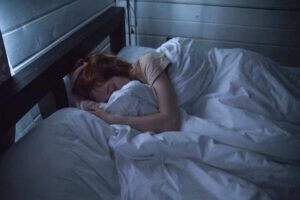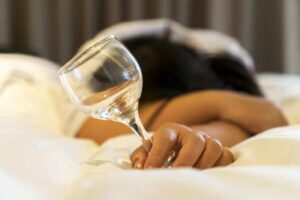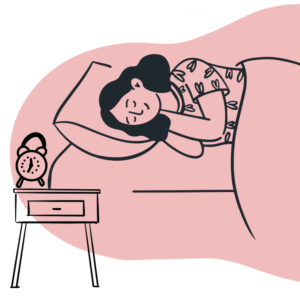Caffeine and Sleep: How to Keep Your Pick-Me-Up From Keeping You Up
Disclosure: By clicking on the product links in this article, Mattress Nerd may receive a commission fee at no cost to you, the reader. Read full disclosure statement.
When you don’t get enough sleep, drinking caffeine is often a temporary solution to cope with daytime sleepiness. But trying to supplement your snooze with a cup of coffee can be a vicious cycle. Here’s how to balance the benefits of caffeine without wrecking your sleep schedule.
How Does Caffeine Work?
Caffeine is a central nervous system stimulant—meaning it stimulates chemicals in your brain. Specifically, caffeine blocks adenosine receptors that make you feel tired. As a result, you get a boost of energy and alertness when you consume caffeine.
When you drink or eat caffeine, your body absorbs it in 45 minutes to one hour. When caffeine enters your body, it blocks those adenosine receptors and helps you feel more awake and energized. Caffeine’s effects peak between 15 and 120 minutes after consuming it. (This effect will be a little weaker if you eat food with caffeine.)
For the average person, the effects of caffeine last about 5 hours, and half of the amount of caffeine you consume will stay in your bloodstream for another 5 hours. However, some folks may be more tolerant or sensitive to caffeine, making the effects last for shorter or longer durations.
Common Caffeine Sources
Most people consume caffeine from plant sources like coffee beans and tea leaves. Foods like chocolate, flavorings like guarana, and herbs like yerba mate also contain caffeine. Caffeine can also be added as a separate ingredient to foods and drinks, like soft drinks and energy drinks.
So how much caffeine is in that cup of joe? Here’s a look at some common caffeine sources.
| Beverage/food | Caffeine content |
| Cup of coffee | 80-100 milligrams |
| Energy drink | 40-250 mg (per 8 ounces) |
| Cup of green or black tea | 30-50 mg |
| 12-ounce caffeinated soft drink | 30-40 mg |
| 100 grams of chocolate (one large bar) | 20 mg (milk chocolate) – 80 mg (dark chocolate) |
How strong you brew coffee or tea can also nearly double the amount per cup. The U.S. Food and Drug Administration suggests that adults shouldn’t consume more than 400 mg of caffeine daily (about 4 cups of coffee). Consuming more may make caffeine’s effects last longer. Too much caffeine can also cause side effects like increased heartbeat, stomach issues, anxiety, and insomnia.
How Caffeine Affects Your Sleep
Since caffeine is a stimulant that makes you feel awake, it’s no surprise that it can make it harder to fall asleep. But caffeine can also make it difficult to stay asleep and get enough hours of shut-eye at night.
Caffeine makes it difficult to fall asleep
When you have a caffeinated beverage, your brain tells your body to stay alert. This can make it extra tough to fall asleep. It takes your body about 5 hours to break down and metabolize just half of the caffeine you drink. If you drink 80 milligrams of caffeine at 4 p.m., you still have about 40 mg of caffeine in your body by 9 p.m. This may make you feel restless at bedtime.
Caffeine alters sleep hormones and neurotransmitters
Caffeine disrupts adenosine and melatonin levels needed to feel sleepy and stay asleep. Adenosine normally increases throughout the day, making you feel sleepier (hello, afternoon slump). When you consume caffeine, you’re lowering your overall adenosine levels and may feel more awake at night. Caffeine also reduces melatonin levels, an important sleep hormone that increases at night to help you sleep.
Caffeine hurts sleep quality and duration
Caffeine can affect the duration and quality of your sleep, making you wake up more frequently and feel more tired during the day. Drinking high amounts of caffeine can also reduce the intensity of deep sleep and your overall sleep hours. A 2013 study found folks lost 1 hour of sleep when they consumed caffeine 6 hours before trying to sleep.
Caffeine can make insomnia worse
It’s unlikely drinking too much coffee causes chronic insomnia, but drinking too much caffeine during that day can worsen insomnia symptoms. People with a sleep disorder who overdo caffeine—often to make up for daytime sleepiness—may find it’s even more difficult to sleep.
When to Stop Having Caffeine Before Bed
If you’re sensitive to caffeine, avoid caffeine in the late afternoon and evening so you don’t feel too alert at bedtime. It takes about 10 hours for caffeine’s effects to totally wear off. Still, you’ll usually only feel the effects for about 5 hours.
However, some folks may be more sensitive to caffeine, and the effects can last longer. Studies suggest consuming caffeine 6 hours before bedtime still disrupts sleep. So if you go to bed at 10 p.m., you should avoid having caffeine after 4 p.m.
Other Factors That Can Affect Sleep
Caffeine use isn’t the only thing that can affect your sleep. Other factors that can make it challenging to get enough quality sleep include:
- Drinking alcohol. Alcohol disrupts your sleep pattern, making it difficult to get quality sleep. Heavy drinking and alcohol dependence is also linked to insomnia.
- Sleep disorders. Conditions like insomnia, hypersomnia, narcolepsy, and sleep apnea make it difficult to sleep at night.
- Disruptive sleep environment. Too much light and noise can keep you up. Blue light from late-night scrolling also lowers melatonin levels, making sleeping difficult.
- Smoking cigarettes. Folks who smoke are more likely to have trouble staying asleep. Smoking also increases your risk of nighttime breathing issues, like snoring and sleep apnea.
- Stress and mental health conditions. Folks with anxiety and depression often have trouble sleeping and develop insomnia. Stress can also suppress sleep hormone levels.
Frequently Asked Questions
How much caffeine keeps you awake?
Everyone metabolizes caffeine differently, but the average person feels the effects of caffeine for a few hours. Research has shown 5 cups of coffee (about 400 mg of caffeine) reduced sleep duration and sleep patterns.
Can caffeine cause sleepless nights?
Yes, drinking caffeine late in the afternoon or evening can cause you to feel worried and stay awake at night. Consuming high levels of caffeine earlier in the day can also cause sleep issues.
Can you drink caffeine and still fall asleep?
Since everyone metabolizes caffeine differently, it is possible to fall asleep after you drink caffeinated beverages. Still, most people will have difficulty sleeping since caffeine makes you feel awake and alert.
Takeaway
Caffeine and sleep have a strenuous relationship. Sure, a cup or two of coffee can make you feel more alert, especially after a sleepless night. But caffeine can make it more difficult to fall asleep, stay asleep, and get enough quality sleep the next night. To help coffee and sleep live in harmony, avoid consuming more than 400 mg of caffeine a day and skip caffeine in the late afternoon.
Source List
- Clark I, et al. (2017). Coffee, Caffeine, and Sleep: A Systematic Review of Epidemiological Stuides and Randomized Controlled Trials. https://www.sciencedirect.com/science/article/abs/pii/S1087079216000150
- Chakravorty S, et al. (2016). Alcohol Dependence and Its Relationship With Insomnia and Other Sleep Disorders. https://onlinelibrary.wiley.com/doi/abs/10.1111/acer.13217
- Chaudhary NS, et al. (2016). Caffeine Consumption, Insomnia, and Sleep Duration: Results From a Nationally Representative Sample. https://www.ncbi.nlm.nih.gov/pmc/articles/PMC6230475/
- Drake C, et al. (2013). Caffeine Effects on Sleep Taken 0, 3, or 6 Hours Before Going to Bed. https://jcsm.aasm.org/doi/10.5664/jcsm.3170
- Evans J, et al. (2022). Caffeine. https://www.ncbi.nlm.nih.gov/books/NBK519490/
- Liao Y, et al. (2019). Sleep Quality in Cigarette Smokers and Nonsmokers: Findings From the General Population in Central China. https://bmcpublichealth.biomedcentral.com/articles/10.1186/s12889-019-6929-4
- Merrill RM. (2022). Mental Health Conditions According to Stress and Sleep Disorders. https://www.ncbi.nlm.nih.gov/pmc/articles/PMC9265846/
- O’Callaghan. (2018). Effects of caffeine on sleep quality and daytime functioning. https://www.ncbi.nlm.nih.gov/pmc/articles/PMC6292246/
- Tähkämö L. (2018). Systematic Review of Light Exposure Impact on Human Circadian Rhythm. https://www.tandfonline.com/doi/full/10.1080/07420528.2018.1527773
- U.S. Food and Drug Administration. (2018). Spilling the beans: How much caffeine is too much? https://www.fda.gov/consumers/consumer-updates/spilling-beans-how-much-caffeine-too-much


